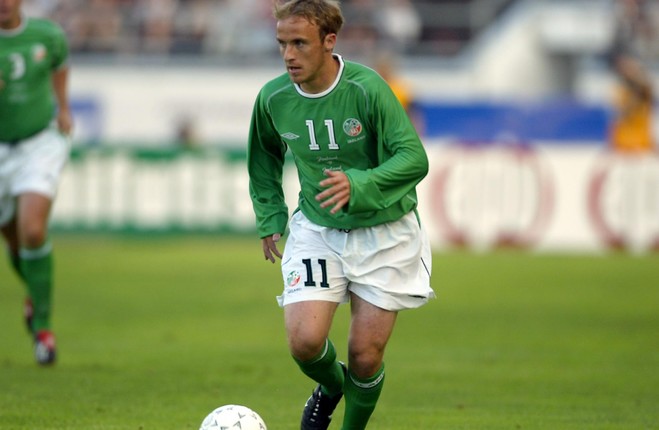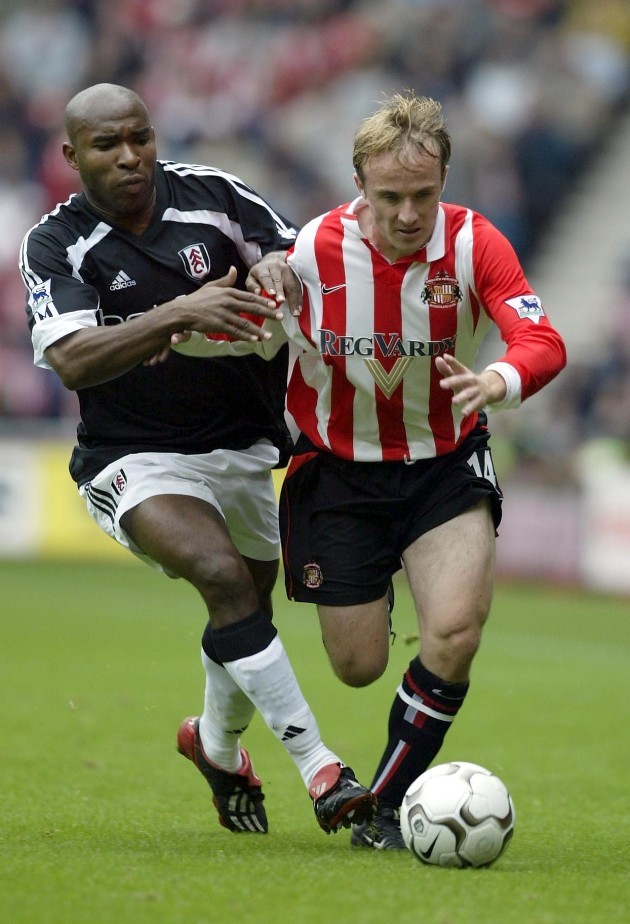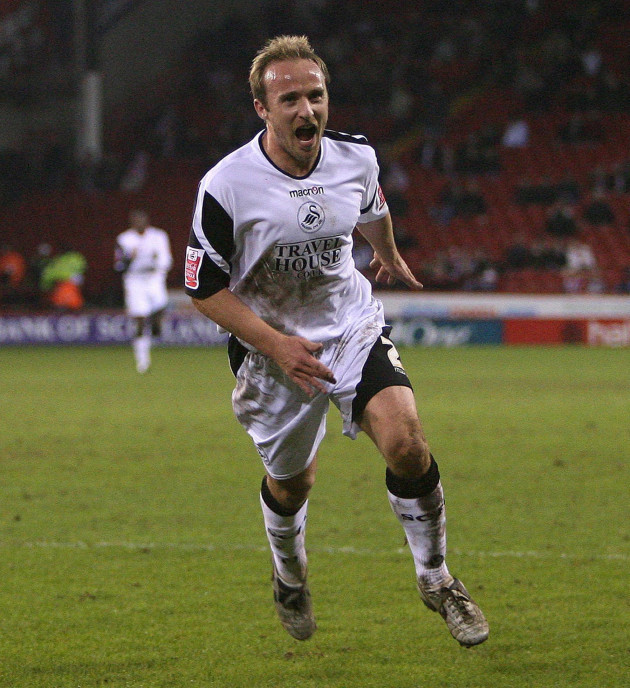PETER REID WAS ranting and when Peter Reid was ranting there was only one thing to do. Get the head down, keep your mouth shut and perfect the art of staring at the floor. In each category, Tommy Butler was showing world class qualities.
Already his day had been strange and surreal, starting on the bench, taking in a second half cameo, ending with a brief conversation with Freddie Ljungberg.
“You’re a good player,” Ljungberg said to him.
“Thanks, you wouldn’t mind if we swapped shirts?” Butler replied.
They shook hands on the deal and retreated to their respective dressing rooms to reflect on their day’s work. Ljungberg, and Arsenal, had played brilliantly, winning 3-0, two months shy of their second Premier League title, two years prior to their Invincible season.
“Men against mice,” Reid said to his Sunderland players after the game. “We put you up in a nice hotel, we look after you, and that’s how you play.”
“He had one of those faces on him,” Butler reflects, “the kind where you make sure you avoid eye contact with him.”
A lot of more experienced eyes than his were staring at the tiled floor of the Highbury dressing room. It was approaching 5:00 in the afternoon, approaching the turn in Sunderland’s road. Gone were the seventh-placed finishes, ‘the magic carpet ride’ that Niall Quinn talked about.
As a team they were on the slide and Reid was doing everything he could to halt it. “He was making a point about us showing too much respect to them, not being streetwise enough,” Butler says. “Sitting there, I was thinking, ‘I’m alright here, I’m a young lad, I played well when I came on at half-time, I showed no fear’.
“Reidy, meanwhile, was calling this fella out. ‘You were a disgrace,’ he told him. He pointed out an incident that led to one of Arsenal’s goals. ‘That was shite,’ he said. He paused for a moment. No one spoke. You couldn’t even hear the shuffle of boots. No one dared move. Next thing there’s a knock on the door.
“Everyone looks up. It’s Freddie Ljungberg. ‘Alright Tommy’, he says, ‘here’s my shirt that you asked for’. With that, he walks in and hands me his jersey. Niall Quinn was sitting next to me. He just grabbed me in a headlock and said, ‘Tommy, you’re a f**king idiot, never do that again’.”
There was little danger of that after the look Reid subsequently gave him. “I was acting like a fan, not a player,” Butler says. “I was so naïve.”
**
He isn’t now. Time changes everyone and both it and injuries changed Tommy Butler. That day at Highbury he was on the cusp of making it. Twenty-one years old, the possessor of a winger’s repertoire of tricks and the knowledge he had the measure of Oleg Luzhny, the Arsenal full-back who was trying, but failing, to mark him.
Two months later, Butler was man of the match at Charlton and three months after that he was making his Ireland debut in Finland, dubbed the new Damien Duff by the morning newspapers. If he was stock, he’d have been a blue chip investment.
Everything was starting to happen and then everything started to go wrong. At 21, he was tipped for the top, at 24 he was in an emotional pit, his body battered after three operations and four hamstring tears, his love of the game gone.
“Most players live with some sort of pain most days of their career,” Butler says. “You get used to it. But by the time I was 24, there was bone floating about in my ankle and I was in agony. I shouldn’t even have been on the pitch. I felt sorry for myself, felt sorry for the club, too. They were paying your wages and I was physically and mentally exhausted. I needed a break from football.”
He headed back to his parents place in Coolock, the refuge of some home cooking exactly what he needed. Six months later he was ready to go back. “When I left Sunderland I would have been in a depressed state,” he says.
More pain would follow. “Trying to get back into the game was a nightmare. One club after the next was asked if they’d sign me and it was a straight off ‘no’. Nobody in England would go near me, wouldn’t even take me on trial. It was horrible.”
It’d get better. Dunfermline – populated by a gang of Irishmen, Noel Hunt, Gary Dempsey, Stephen Bradley, Stephen O’Donnell and Richie Byrne – was fun. Six months there led to his confidence returning. Next stop was Swansea, where under the tutelage of Kenny Jackett, Roberto Martinez and Brendan Rodgers, his upward swing continued.
“If you’re lucky in football, you’ll get some club and some manager where everything clicks,” Butler says. “For me, that was Roberto.”
Straight away he liked the cut of the Spaniard’s chat. First day in the job, Martinez gathered the Swansea players in a huddle and told them they’d pass their way to the top of the league and out of League One.
“If I am honest, at the time I thought this guy will be sacked in a fortnight because League One was a league for kickers. But he was spot on in his assessment. Everywhere else in the game, there was stress, a manager under pressure who passes that anxiety on to the players. But under Roberto, there was this attitude: ‘I want you to be happy’.”
And he was.
“For the first time ever I was injury free,” Butler said. “Roberto had been studying my career, my injury profile, how ankle problems reoccurred whenever I’d been overworked. He pulls out his laptop and shows me a screen filled with data about my career, telling me my stats were up there with the best wingers in the Premier League in terms of crosses and assists. ‘You’re key to us,’ he said to me. ‘Now go home and rest. We need you Saturday. It’s Luton tonight, we’ll win this’. Jeez, the confidence I got from that talk.”
As he tells this story he thinks back to an earlier manager of his, Howard Wilkinson. Butler hated the former Leeds manager’s training sessions, frequently bored by their longevity. One day they sat in a video room watching geese fly in formation, Wilkinson telling the players to note how when one geese slipped off, another came in. “It didn’t make me either a better footballer or more appreciative of geese,” Butler says.
Martinez and Rodgers did improve his game, though.
“Roberto would use mind games on us,” Butler says. “Half-time once, we are 1-0 down and he’s in the dressing room talking softly, saying ‘I’m trying to get the chairman to pay for weekends in a spa for you; to spend money on heart monitors. Lads, you aren’t exactly helping our cause’. He’d walk out of the dressing room, probably pissing himself laughing. There’d nearly be tears in our eyes because we all felt we had let him down. Second half, we turned it on and won 4-1.
“Joe Allen was at the club at the time, a teenager making his way.
“I distinctly remember saying to Joe, ‘look bud, listen to everything this fella tells you because you’ll learn more off him in six months than you will in six years off other managers’.”
**
These days people pay money for Butler’s opinion. Since retiring eight years ago, he has worked as a freelance scout and as a consultant for agents. The game has left its scars. For starters, he walks with a slight limp, the arthritis in his right ankle troubling him periodically.
He lives with the pain and lives with the knowledge the game he fell in love with is as cynical as it gets. “The number one thing managers ask you about is mentality,” he says. “When I was coming through, the questions were about your touch, your movement, your game-awareness.
“Kids have it harder now. You mess up once on social media and there’s a shitstorm. Make one or two mistakes and before you know it, doors close on you. They hear a fella was once caught out at 2am in the morning and that’s it, there’s an asterisk beside his name. I kind of like being able to steer young lads away from the mistakes I made when I was 20, 21.”
Such as?
Well, I wouldn’t have had a strict diet. I wouldn’t go to bed at 8.30. I’m not shy of saying to young players that it is okay if people call you a boring f**ker because you are sitting in. That is how you need to live. Give yourself every chance possible to make it in the game.
“Back when I was 21, the culture in the game was wrong. You’d play a match, be dehydrated afterwards and then go out and drink 10 pints. It was madness.”
So too was a decision he made shortly after that Arsenal game.
“I was driving a Volkswagen Golf and guys who weren’t even in the reserves were coming into training in Porches and I was convinced that people didn’t respect me for what I was spending my money on.
So the next thing you know, I get a BMW, complete with a telly inside it. My thinking was that if get this flashy stuff then I will get treated better. It was nonsense of course. Like, John O’Shea is the same age as me. John drove an Audi A4 for years and Alex Ferguson never considered his motor when he sat down to pick him in the United team.
“But I drew attention to myself for the wrong reasons when I went out and bought that BMW. If that happened now, say under Brendan Rodgers, he’d bring the player into his office and gently say they weren’t ready for it yet, that you have to earn it. You live and learn.”
Butler did his learning the hard way.



